Professional Development
The DRCO enhances teachers' access to professional development training by offering resources they can access at their own pace.
Daily Report Card Online (DRCO) helps you spend more time teaching and less time managing behavior.
How does it work?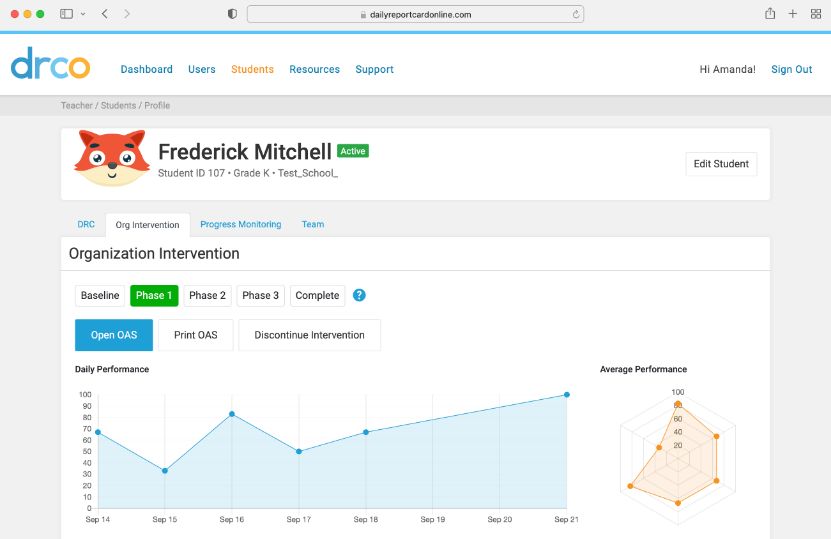
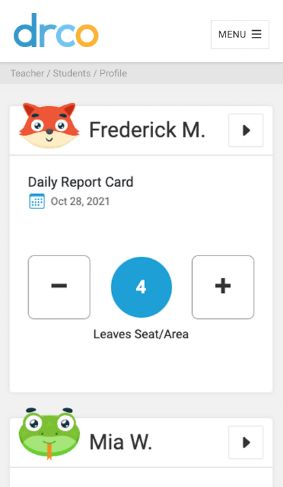
DRCO is an interactive, web-based tool to support school professionals as they develop and implement the Daily Report Card (DRC) intervention. DRCO has been developed in collaboration with teachers, behavioral support staff, and school administrators so that is it user-friendly, data-driven, efficient, and effective.
The DRCO enhances teachers' access to professional development training by offering resources they can access at their own pace.
The interactive screening tools help teachers determine if a student is a good candidate for an intervention. These tools can be used to monitor student progress over time.
The interactive intervention development process mirrors best practices in school consultation and guides teachers through selecting and prioritizing target behaviors.
The system includes a library of clearly-defined target behaviors which saves teachers time during development and offers consistency in the intervention across classrooms, teachers, and settings.
Real-time data collection tools help teachers track behaviors to obtain baseline and intervention data.
Data-based algorithms guide teachers’ decisions about where to set initial goals and how to change goals over time, ensuring student success.
Real-time graphs offer information about student progress and can be shared at school team meetings and with families via the parent/caregiver portal.
The Daily Report Card (DRC) intervention is a contract between a student and teacher that is designed to enhance student success in the classroom. When used well, it gives students a set of clear expectations to follow, individualized goals for success, and motivation to succeed. It also provides a positive way for teachers, students, and parents to communicate about student behavior and progress.
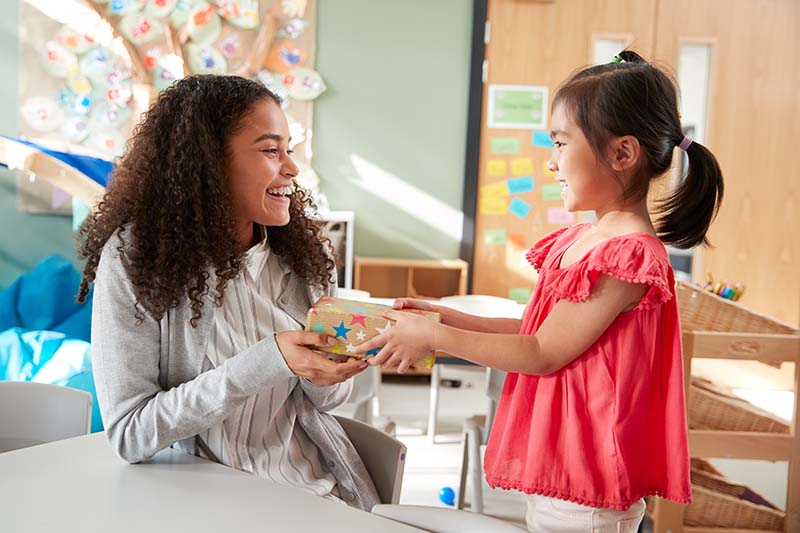
The Daily Report Card tells the student exactly what is expected. Students thrive when environments are clear and predictable.
When the teacher provides positive feedback, it encourages the student to continue practicing positive behaviors. When the teacher provides corrective feedback and gives the student an opportunity to practice the skill, it helps them build new competencies.
Some students are motivated by special rewards (e.g., being a line leader, having computer time, earning home-based privileges), which can help them achieve their goals and improve their behavior.
The Daily Report Card gives students and teachers a positive way to communicate about important behaviors. Many teachers report their relationship with students became more positive once they had this "special way" to communicate. Positive-student teacher relationships are associated with student engagement in learning and positive academic outcomes.
There is plenty of room for flexibility, creativity and individualization in the DRC process. Teachers can decide how to talk to parents and students about the process, which behaviors to prioritize, how to give daily feedback to the child, and what motivators to use. Thus, teachers can make the DRC fit their style and student needs.
We believe that all children have a right to receive high-quality education that includes instruction on social, emotional, and behavioral well-being. We believe that all children can learn and that educational and behavioral supports should be provided equitably regardless of student ability, race, culture, religion, country of origin, ethnicity, sex, gender identity, socioeconomic status, or other characteristics. We believe that all children can succeed if given supports that are well matched to their needs.
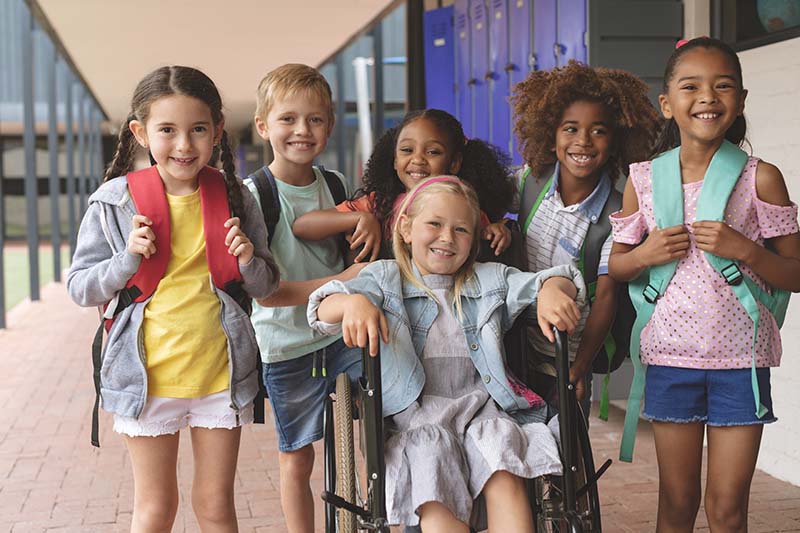
The data generated through assessments and during interventions include potentially sensitive information about individual students. Thus, DRCO employs state-of-the-art privacy and security measures that meet or exceed industry best practices.
All sensitive information is stored and managed in accordance with Ohio University Information Security Standards.
The core DRCO team is comprised of faculty and graduate students affiliated with Ohio University’s Center for Intervention Research in Schools (CIRS) and our technology design partners. However, the development of the DRCO has occurred over the course of several collaborative projects, thus, we acknowledge additional contributory partners below.
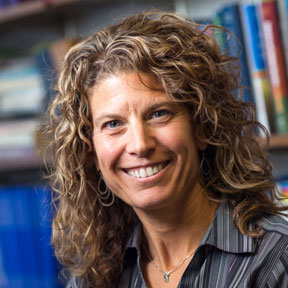
Dr. Owens is a Professor in the Department of Psychology at Ohio University and Co-Director of the Center for Intervention Research in Schools. She has worked collaboratively for over 20 years with school personnel to develop and evaluate school mental health screening, intervention, and progress monitoring procedures. Learn more about Dr. Owens

Dr. Evans is a former special education teacher and professor in the Department of Psychology at Ohio University and Co-Director of the Center for Intervention Research in Schools. Dr. Evans has an extensive background in school based treatment of students with social and emotional issues. Learn more about Dr. Evans

Sam Girton is a professor in the School of Visual Communication at Ohio University. His research and creative activity involves interactive design, web development, motion graphics, video production and commercial photography. Learn more about Sam

Tom Reid has earned a reputation as a technology visionary and a hands-on leader with over three decades of experience as an information technology executive. In the past twelve years his team has managed more than $1 billion in project value supported with $175 million in grant funding won for his clients from three different federal agencies. Learn more about Tom
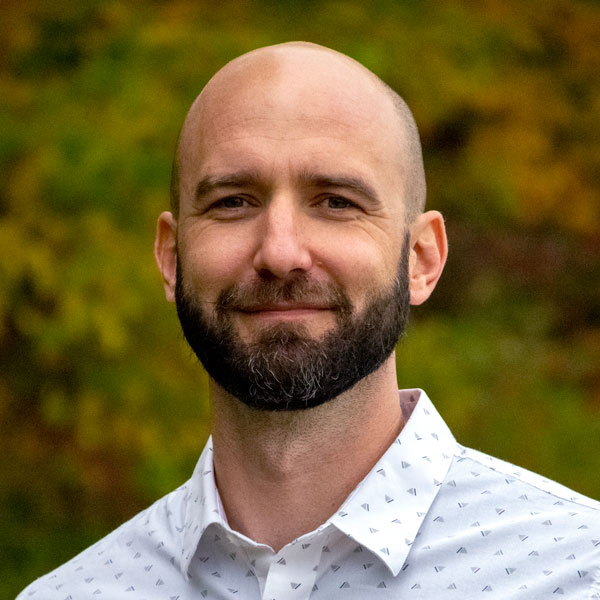
Jacob Reid is a software architect with over a decade of experience producing engaging digital products for web and mobile. He has a high level of expertise in human-centered design principles, and has led teams to produce and maintain world-class web applications. Learn more about Jacob
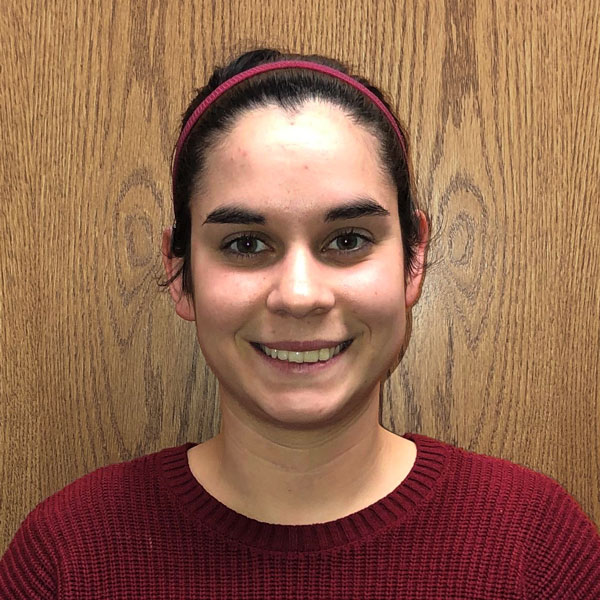
Mary Lee is a graduate student in the clinical psychology doctoral program at Ohio University. She has worked in preschool and elementary schools, offering consultation on positive behavior supports and effective classroom management. She had provided clinical services to youth and families in clinic, primary care, and therapeutic camp settings She has contributed to the development of the DRCO for four years.

Madeline DeShazer is a graduate student in the clinical psychology doctoral program at Ohio University. She has provided clinical services to youth and families in clinic and therapeutic camp settings and has contributed to the development of the DRCO for two years.
Erika Coles, PhD
Deinera Exner-Cortens, PhD
Rebecca Haines-Saah, PhD
Alex Holdaway, PhD
Chelsea Hustus, PhD
John McLennan, MD, MPH, PhD
Sarah Mitchell, MA
Clifton Mixon, PhD
Susan J. Schroer
Verenea Serrano, PhD
Amanda Weisbrod
Please fill out this form with your preferred contact method, and we will contact you soon.
Your message has been successfully sent. We will contact you soon!
